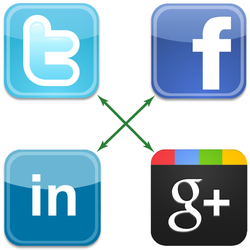 I shared my views about automated or scheduled posts a few weeks ago. A couple of days ago, I saw this post on Lara Wellman’s Facebook page that sparked a pretty in-depth conversation about linking posts or cross-posting to different platforms. This is a different type of automation that can turn off an audience fairly quickly.
I shared my views about automated or scheduled posts a few weeks ago. A couple of days ago, I saw this post on Lara Wellman’s Facebook page that sparked a pretty in-depth conversation about linking posts or cross-posting to different platforms. This is a different type of automation that can turn off an audience fairly quickly.
Lara shared the tip that one shouldn’t link your Twitter feed to Facebook or LinkedIn, both of which are very easy to set up. Some people do so selectively and that’s okay because they’re consciously thinking about which tweets they want to share with their Facebook audience rather than indiscriminately posting them all. There is only one word for linking a twitter account to other platforms: annoying. If I follow someone on twitter, having them post those updates to LinkedIn and Facebook as well is a big turn off. I will generally hide (or unfollow) people who do this on Facebook. That means I miss any original content they happen to post.
In the process of discussing the practice of linking social networks, another controversial practice was brought up - posting identical content across several platforms. This is primarily an issue that is isolated to Facebook, LinkedIn and Google+ since they allow long-form status updates. It can include Twitter, but I’ll come back to that.
When I shared my last Media Mesh post, here’s what happened:
- Facebook: Automatically updated when RSS Graffiti pulls my feed. (Side note: I’m considering discontinuing this particular automation due to the impact it has on engagement and Edge Rank. Even Facebook doesn’t like you to automate!) I try to remember to manually share the same post the next day when I don’t have a regular post scheduled.
- LinkedIn: I posted the link with this message - “Do you have a business or know of one that’s interested in starting a blog? Here’s a few suggestions on where to start.”
- Google+: Again, I posted the link, but with a different message - “This is just the first ten I thought of, but I’m sure there are more suggestions. What advice would you give to a business that wants to start a blog?”
It’s my view that these three tools are unique in features, audience, reach and engagement.
I’m just getting started using LinkedIn to promote my content, but for now I’m going with a business angle because that seems to make the most sense. I also don’t see a lot of engagement on LinkedIn, so a call to action may not be appropriate. With Google+ I do get a lot of feedback from the audience, so I tend to ask their opinion and give them the option of adding to my thoughts. With Facebook I might do something similar, but I might ask users what their top DOs and DON’Ts are for starting a blog.
These are subtle differences that will create a different conversation on each platform - ideally - and engage users/followers in a way that works best on the platform. That’s a strategic decision that I’ve made for my content.
But does it work to post the identical message and call to action on all three? Sometimes, but it’s not always a good idea. It’s important to know your audience with each platform. If you have a lot of overlap, tailor your messaging or change the time you post so that you don’t look as if you’re blatantly copying and pasting. It’s really worth it to take a few extra seconds to actively engage in a more personalized, audience-specific way.







